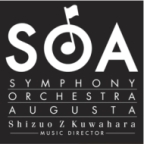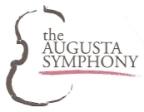Rookie Music Director – Journey for Finding Answers
Rookie Music Director
– Journey for Finding Answers –
Augusta, Georgia… On the steps of Sacred Heart Cultural Center at 11 a.m., President of the Augusta Symphony Board of Directors, Phil Caldwell, announces on Wednesday, March 25, 2009 that Shizuo Z Kuwahara has accepted the Symphony’s offer to serve as Music Director of the Augusta Symphony Orchestra, effective July 1st.
So it began – the beginning of a new chapter in my life: my first music directorship with a professional symphony orchestra.
The orchestra’s search committee invited me to visit Augusta to conduct a subscription concert in January, earlier this year.My schedule throughout the week was packed with TV, radio, and newspaper interviews as well as meetings with many individuals.Interestingly, it seemed the question that was posed to me the most was “how will you build new audience?”I had some ideas from other orchestras and also ideas of my own, but I immediately realized that there was a key element missing from this orchestra – identity.
Any successful organization, not necessary just in the music industry, must have a strong identity.Without an identity that a wide range of people can relate to, I knew it would be difficult to connect with the community.Some members of the audience told me that the image of the orchestra has been ‘music for high-class people.’ At the conclusion of my initial visit, I also felt an energy and will from musicians, staff and supporters of the orchestra – they were ready for a change.
After the initial visit, I began sketching out the programs for the new season and started thinking about different aspects of the orchestra – beginning with the purpose.The mission statement was:
To be the premier provider of orchestral music in the Central Savannah River Area.
I was not sure that this statement reflected or motivated those involved in the orchestra, and I personally wanted us to accomplish beyond what is stated in this mission.
As soon as I was appointed as the music director designate in March, I asked the orchestra’s executive director to round up 10 to 15 people who are leaders involved in this organization, including administrators, musicians and support groups.Although I knew that it was not going to be easy for everyone to agree on one statement, I believed it was more important to work as a team and get to know each other through this process and communicate to each other what we each envision for this orchestra.After several sessions of brainstorming and putting words together, the new mission was born:
To share the joy of great musical performances with our audience.
Together, we are music.
The spirit of the mission is completely different from the previous one.And as I hoped for, this process helped people to come together and helped us become more cohesive through this process.
While the process of coming up with a new mission statement was in progress, I was also concerned with the absence of strong identity in the name and the logo of the orchestra.
There were several problems with creating a logo.One issue was the fact that the initials of the orchestra (ASO) were the same as an orchestra only a couple of hours away from Augusta – the Atlanta Symphony Orchestra.In fact, there are lots of ASOs in the country: Atlanta, Albany, Austin, just to name a few.In order to lead the orchestra into the next stage, we had to have a name that was unique within this country.After coming up with several unusable names, I realized that being situated in Augusta was a very important part of this orchestra’s identity.So we simply switched around the words: Symphony Orchestra Augusta.We worked with graphic designers to portray the character of this orchestra:
The logo has a simple three-letter initial of the orchestra’s name with a note head at the center of letter “O” (and yes, some might see a similarity with a golf flag: Augusta, and its Nationals).
Changing the name, creating a new logo, and redefining the mission statement are important steps to strengthening the identity of the orchestra, but this is not the only answer.Of course it is important to build the audience, and to challenge ourselves as artists to aim for the highest integrity of music making. But as one of the leading cultural institutions in the city of Augusta, what really is our job?
As we attempt to grow artistically, we are also facing one of the largest financial recessions in the history of the United States.The history of Augusta is very rich, but it also comes with broken trust between races.Finding ways for music to talk to people, creating a place where everyone can come together and inspire each other to work together toward a common goal – these things, I believe, are some of many things we have to strive for.The season has started and now is the time to put these thoughts into action, always hoping that music will lead us little closer to the answers of the dream we all desire.




No comments yet.
Add your comment